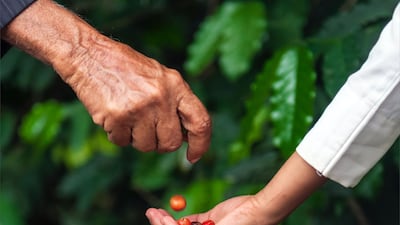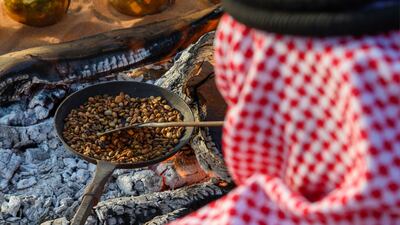For many fasting during Ramadan, the biggest challenge isn't abstaining from food or water, but coffee.
Besides often being a necessary way to kick-start the day, a cup of coffee in the Arab world is layered with symbolisms that extend from the poetic, sweet and matrimonial to the bitter and ominous.
Coffee, in Arabic, is qahwa. In plural form, the word becomes qahwat or qahawen. Al maqha is coffeeshops, though in many parts of the region, especially in countries across the Levant, qahwa is used interchangeably, and more often than al maqha.
Beddi shoufak/shoufik bil qahwa, means "I want to see you over coffee".
While niltiqi bil qahwe translates to, Let’s meet over coffee.
Then there is bedna neeji endkom mishan neshrab qahwa andkon, "We want to come over for coffee".
That last statement can also be telling of an impending proposal. When a man wants to officially ask for a woman’s hand in marriage, his family would contact hers, asking to come over for coffee.
For those who drink Turkish coffee (qahwe turkiyye), a common preference in the Middle East, flipping the cup (finjan) over the saucer (sahn) is the traditional way of signalling you are finished. It is also culturally held that the patterns in the dregs may suggest the future. Fortune tellers who professionally read coffee cups are known as qareat al finjan, one of Egyptian crooner Abdel Halim Hafez’s most famous songs has that as its title. The song is based on a poem by Syrian author Nizar Qabbani.
Many traditions revolve around drinking coffee: it has a place in weddings, funerals and business meetings. In Bedouin culture, specifically, coffee is a representation of hospitality and trust. Every gesture of how the coffee is drunk, or not drunk, has its own meaning. Coffee is traditionally made in a dallah, a coffee pot.
Some people drink their coffee with cardamom (heil), with sugar (sukkar) or with milk (haleeb). Some have it without sugar (sada), like it sweet (helwe), or halfway (wasat).
If someone needs a favour from another that is declined, they could say, qahwetak/qahwetik mabtinshirib, which means: "Your coffee is undrinkable."
Ending on a sweet, not bitter, note a verse by Qabbani relays the significance of coffee.
"Lama ashrab al qahwa maaki ashor inna shajarat al bun al oula zuriat min ajlina," when I drink coffee with you I feel like the first coffee plant was planted for us.









